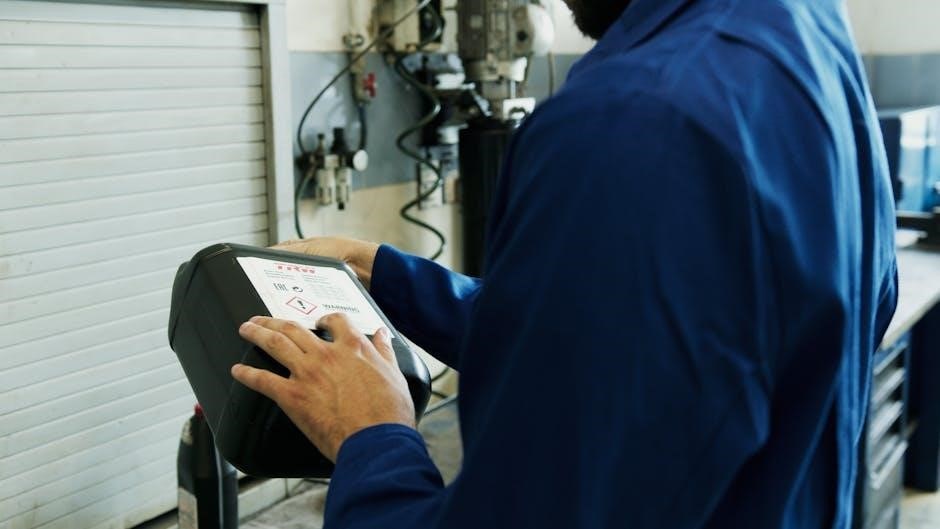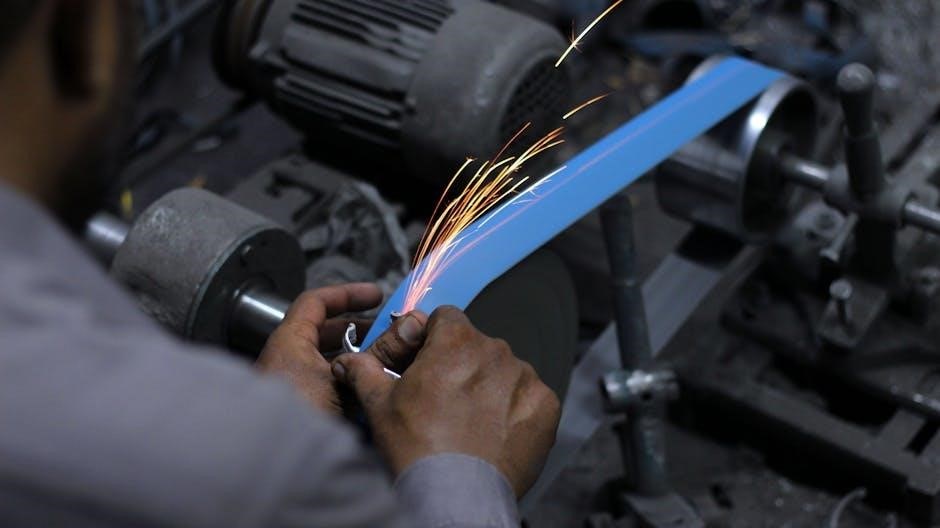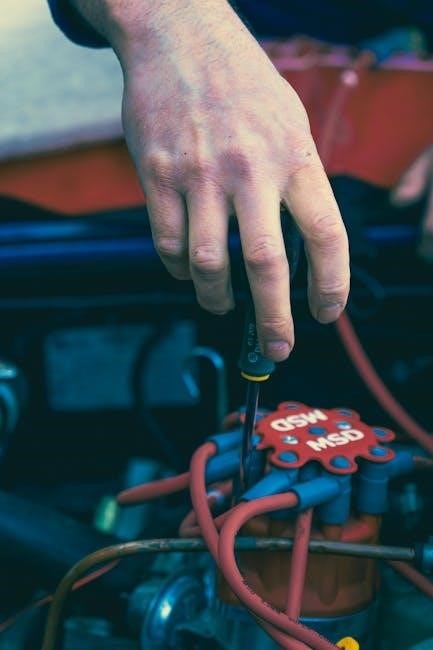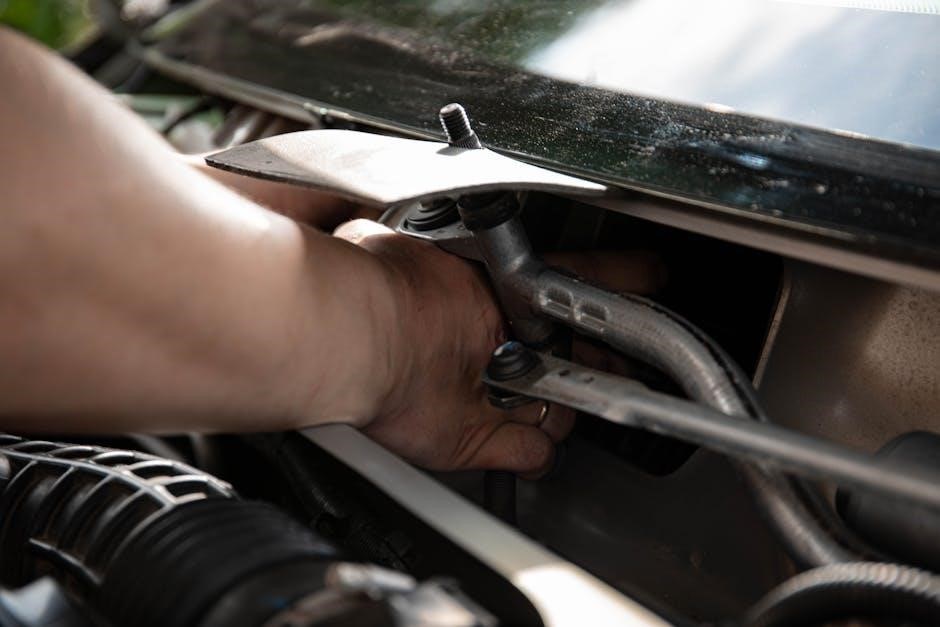The Detroit Diesel Series 60 Engine is a high-performance, heavy-duty diesel engine widely used in trucks and industrial applications. Known for its power and reliability, it offers advanced fuel efficiency and durability. The 12.7-liter model is particularly popular, delivering exceptional performance under demanding conditions. This engine’s design emphasizes longevity and ease of maintenance, making it a preferred choice for fleets and operators. The official service manual provides comprehensive guidance for optimal operation, troubleshooting, and maintenance, ensuring peak performance and compliance with emission standards.
1.1 Overview of the Detroit Diesel Series 60 Engine
The Detroit Diesel Series 60 Engine is a robust, high-performance diesel engine designed for heavy-duty applications. Available in 11.1L, 12.7L, and 14L displacements, it is renowned for its reliability and power. The 12.7L model, in particular, balances fuel efficiency and strength, making it ideal for trucks and industrial machinery. Key features include advanced fuel injection systems, durable construction, and adherence to emission standards. The engine’s modular design simplifies maintenance, while its electronic controls enhance performance monitoring. This engine is a cornerstone in Detroit Diesel’s lineup, trusted for its longevity and versatility in demanding environments.
1.2 Importance of the Service Manual
The service manual for the Detroit Diesel Series 60 Engine is indispensable for optimal performance, safety, and troubleshooting. It provides detailed instructions, diagrams, and specifications for maintenance, repair, and operation. Technicians rely on it to diagnose issues accurately and perform repairs efficiently. The manual ensures compliance with emission standards and prevents costly damage by guiding preventive maintenance. Whether for routine checks or major overhauls, it serves as the primary reference, essential for both experienced mechanics and newcomers to maximize engine longevity and reliability.

Operational Guidelines for the Detroit Series 60 Engine
Operational guidelines ensure safe and efficient engine performance. Procedures include proper starting, monitoring systems, and safe shutdown protocols, all detailed in the service manual for optimal functionality.
2.1 Starting the Engine
Starting the Detroit Diesel Series 60 Engine requires careful preparation. Ensure the parking brake is engaged and all controls are in neutral. Check fuel levels, coolant, and oil before proceeding. Turn the ignition key to the “on” position to power up the electrical system. Allow the glow plugs to pre-heat for the recommended time, typically 10-15 seconds. Turn the key to “start” and monitor the dashboard for warning lights. Once the engine starts, let it idle for a few minutes to warm up. Always refer to the official manual for specific starting procedures under varying conditions.
2.2 Monitoring Engine Performance
Monitoring the Detroit Diesel Series 60 Engine’s performance is crucial for optimal operation. Keep an eye on RPM, oil pressure, coolant temperature, and fuel levels. Ensure all dashboard warning lights are off. Regularly check for unusual noises or vibrations. Maintain proper fluid levels and inspect belts for wear. Address any issues promptly to prevent damage. Use diagnostic tools to track performance metrics and ensure compliance with emission standards. Proper monitoring helps extend engine life and ensures reliable operation under various conditions.
2.3 Shutting Down the Engine
Shutting down the Detroit Diesel Series 60 Engine requires careful steps to ensure safety and prevent damage. Allow the engine to idle for a few minutes to cool down, especially after heavy use. Turn off all accessories and engage the parking brake. Move the transmission to neutral and disable the fuel injection pump. Use the fuel shut-off valve to stop fuel flow. Refer to the official service manual for specific shutdown procedures, as steps may vary by model. Always follow proper shutdown protocols to avoid engine damage and ensure safe operation.
Maintenance and Servicing Schedule
The Detroit Diesel Series 60 12.7L engine requires regular maintenance to ensure optimal performance. Daily checks, scheduled servicing at 250-hour intervals, and major overhauls every 500,000 miles are essential. Compliance with emission standards is maintained through timely filter replacements and system inspections, ensuring reliability and environmental adherence.
3.1 Daily Maintenance Checks
Daily maintenance checks are crucial for ensuring the Detroit Diesel Series 60 Engine operates efficiently. Inspect the oil level, coolant level, and fuel level, ensuring they meet the recommended specifications. Check the air filter for cleanliness and the belts for proper tension and condition. Verify that all hoses and connections are secure and free from leaks. Monitor the battery charge and connections for corrosion. Review the dashboard warning lights and record any unusual readings. These routine checks help prevent unexpected downtime and ensure optimal engine performance, as outlined in the service manual.
3.2 Scheduled Servicing Intervals
The Detroit Diesel Series 60 Engine requires regular servicing at specific intervals to maintain performance and longevity. Oil changes should be performed every 15,000 to 25,000 miles, depending on operating conditions. Fuel filters and air filters should be replaced at 15,000-mile intervals, while the coolant should be changed every 2 years or 30,000 miles. The manual also recommends inspecting and replacing belts, hoses, and other wear components at 50,000-mile intervals. Adhering to these schedules ensures optimal engine efficiency, reduces downtime, and complies with emission standards, as detailed in the official service manual.
3.3 Overhaul and Major Repair Procedures
The Detroit Diesel Series 60 Engine requires periodic overhauls to restore performance and longevity. Major repairs involve disassembling the engine, inspecting components, and replacing worn parts. The official manual recommends overhauling the engine every 500,000 miles or as specified. Key steps include replacing piston rings, bearings, and seals to ensure proper compression and reduce oil consumption. Genuine Detroit Diesel parts are essential for reliability. Adhering to torque specifications and following manual guidelines ensures a successful overhaul, maintaining engine efficiency and compliance with emission standards.

Diagnostic and Troubleshooting Techniques
Identify common issues like low power or excessive smoke using DDEC fault codes. Utilize diagnostic tools for emission system checks and engine performance monitoring. Troubleshoot fuel system malfunctions and EGR-related problems promptly to ensure compliance and optimal performance.
4.1 Identifying Common Issues
Common issues with the Detroit Diesel Series 60 12.7L engine include problems with the EGR system, DPF clogging, and cooling system leaks. The EGR system can malfunction due to soot buildup, requiring periodic cleaning. DPF issues often arise from improper regeneration, leading to reduced performance. Cooling system leaks may cause overheating, which can damage engine components. Additionally, low compression in cylinders and faulty fuel injectors are frequent concerns. Regular maintenance, as outlined in the service manual, helps identify and address these issues early, preventing costly repairs and ensuring optimal engine performance.
4.2 Using Diagnostic Tools and Software
Diagnostics for the Detroit Diesel Series 60 12.7L engine rely on advanced tools and software. The DDEC system provides real-time data and fault codes, enabling precise troubleshooting. Tools like Detroit Diesel’s proprietary diagnostic software allow technicians to identify issues such as EGR system malfunctions or fuel injector problems. Additionally, handheld scanners and fault code readers help pinpoint electrical and mechanical faults. Regular use of these tools ensures early detection of potential issues, minimizing downtime and repair costs. Always refer to the official service manual for detailed diagnostic procedures.
4.3 Troubleshooting Engine Performance Problems
Troubleshooting the Detroit Diesel Series 60 12.7L engine involves identifying issues like low power, excessive emissions, or rough operation. Common problems include faulty EGR valves, clogged fuel injectors, or DDEC system errors. Technicians use diagnostic tools to analyze fault codes and monitor engine parameters. For example, low fuel pressure may indicate a faulty lift pump, while elevated coolant temperatures could signal a malfunctioning cooling system. Addressing these issues promptly ensures optimal performance and prevents costly damage. Always refer to the official service manual for detailed troubleshooting procedures and solutions.

Technical Specifications of the Detroit Series 60 Engine
The Detroit Diesel Series 60 engine is available in 11.1L, 12.7L, and 14L displacements, offering horsepower ranges from 350 to 500 HP and up to 1,850 lb-ft torque. Designed for heavy-duty applications, it meets stringent emission standards, ensuring environmental compliance while delivering exceptional power and efficiency.
5.1 Engine Dimensions and Weight
The Detroit Diesel Series 60 Engine, specifically the 12.7-liter model, is designed for optimal performance while maintaining manageable dimensions. Its compact design ensures compatibility with various applications. The engine’s approximate dimensions are 1,524 mm in length, 1,016 mm in width, and 1,220 mm in height. Weighing around 1,450 kg, it balances power with portability. These specifications make it ideal for heavy-duty trucks and industrial machinery, ensuring ease of integration without compromising on power output or efficiency. The engine’s durability and weight distribution contribute to its reliability in demanding environments.
5.2 Performance Ratings and Capabilities
The Detroit Diesel Series 60 Engine, particularly the 12.7-liter model, delivers exceptional performance with horsepower ratings ranging from 350 to 500 HP. Designed for heavy-duty applications, it produces up to 1,650 lb-ft of torque, ensuring robust power delivery. The engine excels in fuel efficiency, optimizing performance while minimizing consumption. Its advanced design meets stringent emission standards, making it environmentally compliant. With a proven track record in demanding environments, the Series 60 engine is a reliable choice for long-haul trucking, construction, and industrial use, offering unmatched durability and consistent performance.
5.3 Emission Standards and Compliance
The Detroit Diesel Series 60 Engine is designed to meet stringent emission standards, ensuring environmental compliance. Equipped with advanced emission control technologies, it adheres to EPA regulations and reduces harmful emissions. The engine features systems like the Exhaust Gas Recirculation (EGR) and Selective Catalytic Reduction (SCR) to minimize nitrogen oxides and particulate matter. These technologies ensure the engine operates cleanly while maintaining high performance. Compliance with emission standards is achieved without compromising power or fuel efficiency, making the Series 60 a reliable choice for eco-friendly and regulated applications.

Fuel and Cooling Systems
The Detroit Diesel Series 60 Engine features advanced fuel injection systems for optimal performance and efficiency. The cooling system ensures proper temperature regulation, preventing overheating and extending engine life.
6.1 Fuel System Components and Functionality
The Detroit Diesel Series 60 12.7L engine features a robust fuel system designed for optimal performance and efficiency. Key components include fuel injectors, fuel pumps, and fuel filters. The fuel injectors deliver precise fuel amounts, ensuring efficient combustion. The fuel pumps maintain consistent pressure, while filters prevent contaminants from entering the system. The DDEC electronic control system monitors and adjusts fuel delivery for optimal engine performance. Proper maintenance of these components is crucial for maintaining fuel efficiency and reducing emissions, as outlined in the official service manual.
6.2 Cooling System Maintenance and Repair
The cooling system of the Detroit Diesel Series 60 12.7L engine is critical for maintaining optimal operating temperatures. Regular maintenance includes inspecting hoses, belts, and the radiator for leaks or damage. The coolant level and condition should be checked, with the recommended 50/50 glycol-water mixture used to prevent corrosion and freezing. Annual draining and flushing of the system are essential, followed by refilling with the specified coolant. Repairing leaks promptly and ensuring proper fan operation helps prevent overheating, which can lead to costly damage. Adhering to the service manual ensures longevity and efficiency.
6.3 Optimizing Fuel Efficiency
Optimizing fuel efficiency for the Detroit Diesel Series 60 12.7L engine involves regular maintenance and smart driving practices. Ensure proper tire pressure, as under-inflated tires increase fuel consumption. Maintain the engine in top condition by following the service manual’s tuning and filter replacement schedules. Avoid aggressive driving and keep a consistent speed, as this reduces fuel waste. Monitor load management to avoid excessive weight that lowers efficiency. Use the recommended fuel type and consider upgrading to fuel-efficient components. Regularly reviewing fuel consumption data and adjusting habits can significantly improve overall efficiency and reduce operating costs while lowering emissions.

Emission Control Systems
The Detroit Diesel Series 60 12.7L engine features advanced emission control systems to reduce environmental impact. These systems ensure compliance with strict emission standards while maintaining performance and efficiency. Proper maintenance of these systems is critical for optimal operation and minimizing emissions. Regular servicing, as outlined in the manual, helps sustain their effectiveness and ensures the engine operates within regulatory requirements. This contributes to a cleaner environment and reduces operational costs over time. Modern technologies integrated into the engine support eco-friendly performance without compromising power delivery. Regular inspections and updates are essential to maintain peak functionality and adherence to environmental regulations. By following the manual’s guidelines, operators can ensure the emission control systems function at their best, balancing efficiency and sustainability. Monitoring and addressing any issues promptly prevents potential failures and maintains compliance with emission standards. Overall, these systems are vital for both performance and environmental responsibility. Consistent upkeep ensures the engine remains efficient, reliable, and eco-conscious, aligning with current and future emission regulations. Operators are encouraged to prioritize these systems to uphold the engine’s reputation for durability and environmental stewardship. The manual provides detailed instructions to help maintain and troubleshoot these systems effectively, ensuring they continue to perform as intended. This proactive approach not only benefits the environment but also enhances the engine’s overall longevity and cost-effectiveness. Properly functioning emission control systems are a cornerstone of the Detroit Diesel Series 60 engine’s design, reflecting its commitment to innovation and sustainability. By adhering to the manual’s recommendations, operators can maximize the engine’s potential while minimizing its ecological footprint. This comprehensive approach ensures the engine remains a leader in both power and environmental performance. Regular maintenance and adherence to guidelines are key to sustaining these systems’ effectiveness and overall engine health. The Detroit Diesel Series 60 12.7L engine exemplifies a balance between power and environmental responsibility through its advanced emission control technologies. Operators are urged to stay informed and follow best practices to uphold this balance. The engine’s design and the manual’s instructions work together to support eco-friendly operation without sacrificing performance. This integration of technology and guidance ensures the engine meets both operational and environmental demands. By prioritizing emission control system maintenance, operators contribute to a more sustainable future while enjoying the engine’s renowned reliability and efficiency. The Detroit Diesel Series 60 engine stands as a testament to innovation, offering a powerful yet environmentally conscious solution for modern applications. Its emission control systems are a critical component of this legacy, and proper care ensures they continue to deliver as intended. Operators who invest time in maintaining these systems reap the benefits of a high-performing, eco-friendly engine. The manual serves as a valuable resource, providing clear instructions to support these efforts. Together, the engine’s design and the manual’s guidance empower operators to achieve optimal results. The Detroit Diesel Series 60 engine remains a top choice for those seeking a balance of power, efficiency, and environmental responsibility. Its emission control systems are central to this appeal, and their proper maintenance ensures lasting performance; Operators are encouraged to embrace these systems as a key aspect of the engine’s overall excellence. By doing so, they not only preserve the engine’s capabilities but also support broader environmental goals. The Detroit Diesel Series 60 12.7L engine is a prime example of how advanced technology can harmonize with eco-conscious design. Its emission control systems are a testament to this philosophy, offering a powerful yet sustainable solution. Operators who prioritize these systems’ maintenance uphold the engine’s legacy of excellence and environmental stewardship. The manual provides the necessary tools and knowledge to achieve this, ensuring the engine continues to lead in its class. Properly maintained emission control systems are essential for maximizing the engine’s potential and minimizing its environmental impact. Operators are advised to remain vigilant and proactive in their maintenance routines, following the manual’s expert guidance. This commitment not only enhances engine performance but also supports a cleaner, healthier environment. The Detroit Diesel Series 60 engine is engineered to deliver exceptional power while meeting stringent emission standards, making it a responsible choice for modern applications. Its emission control systems are a vital part of this engineering marvel, and their care is essential for sustained performance. Operators who adhere to the manual’s recommendations can trust in the engine’s ability to balance power and efficiency with environmental responsibility. The Detroit Diesel Series 60 12.7L engine is a shining example of innovation and sustainability, thanks in large part to its advanced emission control systems. Properly maintained, these systems ensure the engine operates at peak performance while minimizing its ecological footprint. Operators are encouraged to view these systems as a priority, leveraging the manual’s comprehensive guidance to uphold their effectiveness. This dedication not only preserves the engine’s capabilities but also aligns with global efforts to reduce emissions and promote sustainability. The Detroit Diesel Series 60 engine is a leader in its class, and its emission control systems play a pivotal role in this leadership. Operators who maintain these systems according to the manual’s instructions can expect optimal performance, efficiency, and environmental compliance. This commitment to excellence ensures the engine remains a trusted choice for years to come. The integration of advanced emission control technologies in the Detroit Diesel Series 60 engine underscores its reputation as a powerful yet eco-conscious powerplant. Operators who prioritize the maintenance of these systems, as outlined in the manual, contribute to the engine’s enduring success and environmental stewardship. By staying informed and proactive, operators can maximize the engine’s potential while supporting a sustainable future. The Detroit Diesel Series 60 12.7L engine exemplifies the perfect blend of power, efficiency, and environmental responsibility, with its emission control systems at the heart of this blend. Properly maintained, these systems ensure the engine operates at its best, delivering exceptional performance while minimizing emissions. Operators who follow the manual’s guidance can trust in the engine’s ability to meet both operational and environmental demands. This commitment to excellence ensures the Detroit Diesel Series 60 engine remains a top choice for those seeking a balance of power and sustainability. The engine’s emission control systems are a key factor in this appeal, and their proper maintenance is essential for sustained performance. Operators are encouraged to embrace these systems as a critical component of the engine’s overall excellence. By doing so, they not only preserve the engine’s capabilities but also support broader environmental goals. The Detroit Diesel Series 60 engine is a testament to innovative engineering, offering a powerful yet environmentally friendly solution for modern applications. Its emission control systems are central to this legacy, and their proper maintenance ensures lasting performance. Operators who prioritize these systems’ upkeep, as per the manual’s instructions, uphold the engine’s reputation for excellence and sustainability. The manual serves as a vital resource, providing the knowledge needed to maintain these systems effectively. Together, the engine’s design and the manual’s guidance empower operators to achieve optimal results. The Detroit Diesel Series 60 12.7L engine remains a preferred choice for those seeking a balance of power, efficiency, and environmental responsibility. Its emission control systems are integral to this appeal, and their proper maintenance is crucial for sustained performance. Operators who adhere to the manual’s recommendations can trust in the engine’s ability to deliver exceptional results while minimizing its ecological impact. This commitment to maintenance ensures the engine continues to lead in its class, offering a powerful yet sustainable solution for various applications. The Detroit Diesel Series 60 engine is engineered to excel in both performance and environmental stewardship, with its emission control systems playing a vital role. Operators who follow the manual’s guidance can maximize the engine’s potential, ensuring it operates efficiently while meeting emission standards. This proactive approach not only enhances engine longevity but also supports a cleaner environment. The Detroit Diesel Series 60 12.7L engine stands as a prime example of how advanced technology can harmonize with eco-conscious design. Its emission control systems are a testament to this philosophy, offering a powerful yet sustainable solution. Operators who prioritize these systems’ maintenance uphold the engine’s legacy of excellence and environmental responsibility. The manual provides the necessary tools and knowledge to achieve this, ensuring the engine continues to lead in its class. Properly maintained emission control systems are essential for maximizing the engine’s potential and minimizing its environmental impact. Operators are advised to remain vigilant and proactive in their maintenance routines, following the manual’s expert guidance. This commitment not only enhances engine performance but also supports a cleaner, healthier environment. The Detroit Diesel Series 60 engine is designed to deliver exceptional power while meeting stringent emission standards, making it a responsible choice for modern applications. Its emission control systems are a vital part of this engineering marvel, and their care is essential for sustained performance. Operators who adhere to the manual’s recommendations can trust in the engine’s ability to balance power and efficiency with environmental responsibility. The Detroit Diesel Series 60 12.7L engine is a shining example of innovation and sustainability, thanks in large part to its advanced emission control systems. Properly maintained, these systems ensure the engine operates at peak performance while minimizing its ecological footprint. Operators are encouraged
7.1 Exhaust Gas Recirculation (EGR) System
The Detroit Diesel Series 60 12.7L engine incorporates an advanced Exhaust Gas Recirculation (EGR) system to reduce nitrogen oxide (NOx) emissions. The EGR system reroutes a portion of exhaust gases back into the engine’s combustion chamber, lowering combustion temperatures and reducing emissions. Proper maintenance of the EGR system, including cleaning the EGR valve and cooler, is essential to prevent clogging and ensure optimal performance. The manual provides detailed instructions for inspecting and servicing these components to maintain emission compliance and engine efficiency. Regular upkeep helps prevent issues like reduced power and increased emissions, ensuring the system functions effectively. By adhering to the manual’s guidelines, operators can maintain the EGR system’s reliability and contribute to environmental sustainability. Additionally, the EGR system works in tandem with other emission control technologies to meet stringent regulatory standards. Properly maintained, it plays a critical role in minimizing the engine’s environmental impact while preserving its performance capabilities.
7.2 Selective Catalytic Reduction (SCR) Technology
Selective Catalytic Reduction (SCR) technology is a key emission control system in the Detroit Diesel Series 60 12.7L engine. It reduces nitrogen oxide (NOx) emissions by injecting a urea-based diesel exhaust fluid (DEF) into the exhaust stream. The DEF reacts with exhaust gases in the SCR catalyst, converting NOx into nitrogen and water. This system works in conjunction with the EGR system to meet stringent emission standards. Regular maintenance, such as DEF level checks and catalyst inspections, is essential for optimal performance. The manual provides detailed instructions for SCR system upkeep to ensure compliance with environmental regulations and maintain engine efficiency. Proper SCR operation is critical for minimizing emissions while maximizing engine performance. Operators must adhere to the manual’s guidelines to avoid system malfunctions and ensure long-term reliability. SCR technology plays a vital role in reducing the engine’s environmental impact without compromising power output.
7.3 Emission Standards Compliance
The Detroit Diesel Series 60 12.7L engine is designed to meet stringent EPA emission standards, ensuring reduced environmental impact. By utilizing advanced emission control technologies, including Exhaust Gas Recirculation (EGR) and Selective Catalytic Reduction (SCR), the engine effectively minimizes nitrogen oxides (NOx) and particulate matter emissions. Compliance with these standards is achieved through meticulous engineering and adherence to regulatory requirements. Regular maintenance, as outlined in the service manual, is essential to sustain emission performance and ensure ongoing compliance with environmental regulations.

Detroit Diesel Electronic Control System (DDEC)
The Detroit Diesel Electronic Control System (DDEC) is an advanced engine management system designed to optimize performance, efficiency, and emissions control. It monitors and controls critical engine functions, ensuring precise fuel injection, torque management, and diagnostics. The DDEC system enhances overall engine reliability and operational efficiency, making it a cornerstone of the Series 60 engine’s advanced technology.
8.1 Overview of the DDEC System
The Detroit Diesel Electronic Control (DDEC) system is a sophisticated electronic engine management platform designed to optimize performance, fuel efficiency, and emissions control. It utilizes advanced sensors and software to monitor and regulate engine functions, such as fuel injection timing, exhaust gas recirculation, and turbocharger performance. The DDEC system enhances engine operation by providing real-time diagnostics, fault logging, and adaptive learning capabilities. It plays a critical role in ensuring compliance with emission standards while maintaining peak engine efficiency and reliability. The system is integral to the Series 60 engine’s modernization and operational excellence.
8.2 Calibration and Updates
The DDEC system requires periodic calibration and software updates to ensure optimal engine performance and compliance with emission standards. Calibration involves configuring engine parameters such as fuel injection timing and torque settings, tailored to specific operational demands. Updates are performed using specialized tools and software, ensuring the system remains current with the latest advancements. Proper calibration and updates enhance fuel efficiency, reduce emissions, and maintain engine reliability. Always refer to the official service manual for detailed procedures and guidelines to perform these tasks accurately and safely.
8.3 Diagnostics and Fault Codes
The DDEC system provides advanced diagnostic capabilities to monitor and troubleshoot engine performance issues. Fault codes are stored in the system, allowing technicians to quickly identify problems such as sensor malfunctions or emission control issues. Specialized diagnostic tools and software, like those referenced in the Detroit Diesel Series 60 service manual, enable detailed analysis of engine data and real-time monitoring. Regular diagnostic checks ensure early detection of potential issues, minimizing downtime and maintaining optimal engine efficiency. Referencing the official manual is essential for accurate interpretation and resolution of fault codes.
Safety Precautions and Best Practices
Always follow safety guidelines in the official Detroit Diesel Series 60 manual. Wear personal protective equipment and ensure proper ventilation when working with engines. Handle hot or heavy components with care, and be prepared for emergencies by having fire extinguishers nearby. Regular training and adherence to best practices minimize risks and ensure safe engine operation and maintenance.
9.1 Safety Guidelines for Engine Operation
Ensure all safety precautions are followed when operating the Detroit Diesel Series 60 Engine. Always wear personal protective equipment (PPE), including goggles, gloves, and steel-toe boots. Conduct a thorough pre-operation inspection to identify potential hazards. Properly secure loose clothing and avoid jewelry that may catch on moving parts. Follow the official Detroit Diesel service manual for startup and shutdown procedures. Keep the work area well-ventilated to avoid inhaling harmful fumes. Never operate the engine near open flames or sparks. Stay alert and avoid distractions while the engine is running. Familiarize yourself with emergency shutdown procedures and ensure fire extinguishers are nearby.
9.2 Personal Protective Equipment (PPE)
Wearing proper Personal Protective Equipment (PPE) is crucial when working with the Detroit Diesel Series 60 Engine. Essential items include safety glasses, gloves, and steel-toe boots to protect against chemical spills, sharp objects, and heavy tools. A face mask is recommended when handling dusty or hazardous materials. Ensure all PPE meets industry safety standards. Properly fitted gear reduces the risk of injury during maintenance or operation. Always consult the official Detroit Diesel service manual for specific PPE recommendations tailored to your engine model. Adhering to these guidelines ensures a safer working environment and prevents potential accidents.
Resources and References
9.3 Emergency Procedures
In case of an emergency involving the Detroit Diesel Series 60 Engine, prioritize safety and quick action. If the engine catches fire, use a fire extinguisher rated for diesel fires. Immediately shut off the engine and fuel supply if a leak occurs. Coolant or fuel spills require containment to prevent environmental damage. Always have emergency contact numbers handy. Refer to the official service manual for detailed procedures on handling crises. Regular training and familiarity with emergency protocols can prevent accidents and ensure effective response. Keep emergency kits accessible at all times. Stay calm and follow established guidelines to minimize risks.
